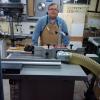
Originally Posted by
Rod Sheridan

Hi Alan, I would ask machinery vendors in your area if they have Techs or know of independent Techs who could do work for you.
I have done work for Felder customers, directly for the customer for work Felder would not do, such as work on machines that didn’t have a valid approval.
The customers paid and interacted with me personally, not through Felder.
The customers were happy to have their machine repaired, as they couldn’t do it themselves.
A couple of instances were modifying unapproved machines so they could pass a field inspection so they could be sold.
I’m sure you’ll be able to find a Tech in your area.
Regards, Rod
Fortunately, brute force (and more helpfully penetrating lubricant) solved the problem and all is well now, although I had to whack on the platen despite significant amount of dry teflon lubrication to get it back in.
So I'm okay for now, but think this scenario may repeat in the future. Although, will spray lubricant in there first.
Interesting suggestion, though. I will keep that in mind for my other machines in the future.
Last edited by Alan Lightstone; 04-11-2024 at 9:08 AM.
- After I ask a stranger if I can pet their dog and they say yes, I like to respond, "I'll keep that in mind" and walk off
- It's above my pay grade. Mongo only pawn in game of life.





 Reply With Quote
Reply With Quote








